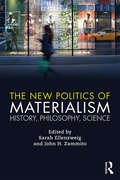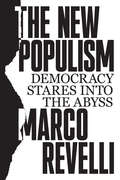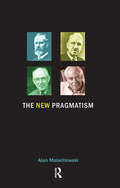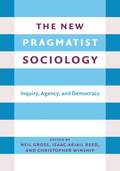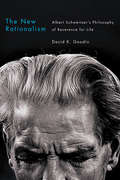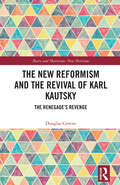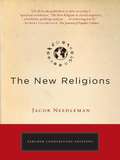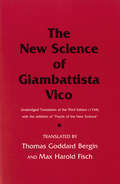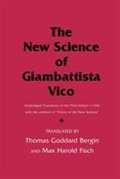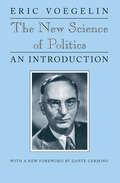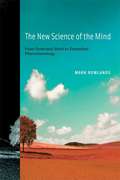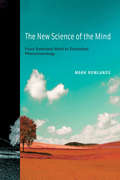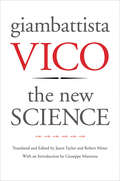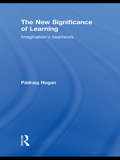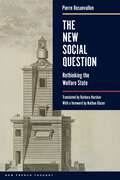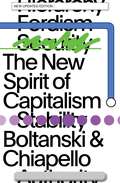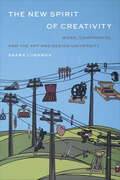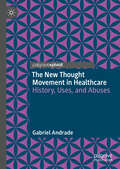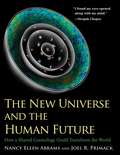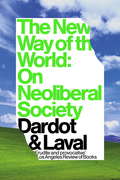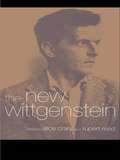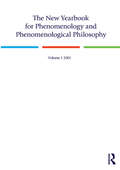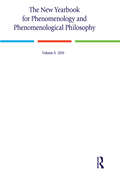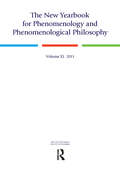- Table View
- List View
The New Politics of Materialism: History, Philosophy, Science
by Sarah Ellenzweig John H ZammitoNew materialism challenges the mechanistic models characteristic of early modern philosophy that regarded matter as largely passive and inert. Instead it gives weight to topics often overlooked in such accounts: agency, vitalism, complexity, contingency, and self-organization. This collection, which includes an international roster of contributors from philosophy, history, literature, and science, is the first to ask what is "new" about the new materialism and place it in interdisciplinary perspective. Against current theories of new materialism it argues for a deeper engagement with materialism's history, questions whether matter can be "lively," and asks whether new materialism's wish to revitalize politics and the political lives up to its promise. Contributors: Keith Ansell-Pearson, Sarah Ellenzweig, Christian J. Emden, N. Katherine Hayles, Jess Keiser, Mogens Laerke, Ian Lowrie, Lenny Moss, Angela Willey, Catherine Wilson, Charles T. Wolfe, Derek Woods, and John H. Zammito.
The New Populism: Democracy Stares into the Abyss
by Marco RevelliA crisp and trenchant dissection of populism todayThe word 'populism' has come to cover all manner of sins. Yet despite the prevalence of its use, it is often difficult to understand what connects its various supposed expressions. From Syriza to Trump and from Podemos to Brexit, the electoral earthquakes of recent years have often been grouped under this term. But what actually defines 'populism'? Is it an ideology, a form of organisation, or a mentality? Marco Revelli seeks to answer this question by getting to grips with the historical dynamics of so-called 'populist' movements. While in the early days of democracy, populism sought to represent classes and social layers who asserted their political role for the first time, in today's post-democratic climate, it instead expresses the grievances of those who had until recently felt that they were included.Having lost their power, the disinherited embrace not a political alternative to -isms like liberalism or socialism, but a populist mood of discontent. The new populism is the 'formless form' that protest and grievance assume in the era of financialisation, in the era where the atomised masses lack voice or organisation. For Revelli, this new populism the child of an age in which the Left has been hollowed out and lost its capacity to offer an alternative.
The New Pragmatism
by Alan MalachowskiSome hundred years after its inception, Pragmatism has reclaimed centre stage, not just within philosophy, but also within intellectual culture as a whole. This book sets out to explain what it is about Pragmatism that makes it such a distinctively attractive prospect to so many thinkers, even in previously hostile traditions. Alan Malachowski sets out in a clear and accessible manner the original guiding thoughts behind the Pragmatist approach to philosophy and examines how these thoughts have faired in the hands of those largely responsible for the present revival (Putnam and Rorty). The Pragmatism that emerges from this exploration of its "classic" and "new wave" forms is then assessed in terms of both its philosophical potential and its wider cultural contribution. Readers will emerge from the book with a more secure grip on what Pragmatism involves and a correspondingly clearer grasp of what it has to offer and what its current resurgence is all about.
The New Pragmatist Sociology: Inquiry, Agency, and Democracy
by John Levi Martin Ann Mische Stefan Timmermans Iddo Tavory Paul Lichterman Jeffrey Parker Daniel Silver Mario Small Daniel Huebner Luis Flores Josh Whitford Mazen Elfakhani Cayce Hughes Vontrese Pamphile Natalie B. Aviles Susan Silbey Karida Brown Luna Vincent Daniel CefaiPragmatist thought is central to sociology. However, sociologists typically encounter pragmatism indirectly, as a philosophy of science or as an influence on canonical social scientists, rather than as a vital source of theory, research questions, and methodological reflection in sociology today.In The New Pragmatist Sociology, Neil Gross, Isaac Ariail Reed, and Christopher Winship assemble a range of sociologists to address essential ideas in the field and their historical and theoretical connection to classical pragmatism. The book examines questions of methodology, social interaction, and politics across the broad themes of inquiry, agency, and democracy. Essays engage widely and deeply with topics that motivate both pragmatist philosophy and sociology, including rationality, speech, truth, expertise, and methodological pluralism.Contributors include Natalie Aviles, Karida Brown, Daniel Cefaï, Mazen Elfakhani, Luis Flores, Daniel Huebner, Cayce C. Hughes, Paul Lichterman, John Levi Martin, Ann Mische, Vontrese D. Pamphile, Jeffrey N. Parker, Susan Sibley, Daniel Silver, Mario Small, Iddo Tavory, Stefan Timmermans, Luna White, and Joshua Whitford.
The New Rationalism
by David K. GoodinAlbert Schweitzer (1875-1965) preached a message of reverence for life - all life - that touched the hearts of a generation. As a medical doctor in French Equatorial Africa who selflessly helped those in need, Schweitzer was recognized with the Nobel Peace Prize in the wake of two world wars. But less than fifty years since the time of his death, the great humanitarian and scholar has faded from public awareness. In The New Rationalism, David Goodin explores the underlying philosophy behind Schweitzer's ethic of compassion, presenting it as a response to contemporary questions in social justice, economic equality, and environmental action. For the first time, the political, sociological, and philosophical contexts supporting the development of Schweitzer's ethic are examined in order to bring his timeless message of elemental morality to new life for the modern world. Inspired by Arthur Schopenhauer and Friedrich Nietzsche, Schweitzer built his ethic to create an elemental nature philosophy compatible with empirical science, and to support a new ontological understanding of the human person - a project he termed the New Rationalism. Goodin recovers and analyzes Schweitzer's arguments and shows where his theories can provide a framework for both environmental and civic ethics today.
The New Rationalism: Albert Schweitzer's Philosophy of Reverence for Life
by David K. GoodinAlbert Schweitzer (1875-1965) preached a message of reverence for life - all life - that touched the hearts of a generation. As a medical doctor in French Equatorial Africa who selflessly helped those in need, Schweitzer was recognized with the Nobel Peace Prize in the wake of two world wars. But less than fifty years since the time of his death, the great humanitarian and scholar has faded from public awareness. In The New Rationalism, David Goodin explores the underlying philosophy behind Schweitzer's ethic of compassion, presenting it as a response to contemporary questions in social justice, economic equality, and environmental action. For the first time, the political, sociological, and philosophical contexts supporting the development of Schweitzer's ethic are examined in order to bring his timeless message of elemental morality to new life for the modern world. Inspired by Arthur Schopenhauer and Friedrich Nietzsche, Schweitzer built his ethic to create an elemental nature philosophy compatible with empirical science, and to support a new ontological understanding of the human person - a project he termed the New Rationalism. Goodin recovers and analyzes Schweitzer's arguments and shows where his theories can provide a framework for both environmental and civic ethics today.
The New Reformism and the Revival of Karl Kautsky: The Renegade’s Revenge (Marx and Marxisms)
by Douglas GreeneThis text offers an authoritative historiography of German socialist theorist Karl Kautsky and his impact on debates about the Russian Revolution and the contemporary left. Known as the “Pope of Marxism,” Douglas Greene examines the totality of Kautsky’s political career and dissects the fundamental opportunism and passive radicalism that defined his Marxism. He later examines the most substantive Marxist critics of Kautsky, namely Rosa Luxemburg, V. I. Lenin, and Leon Trotsky, while offering a critical assessment of the work produced by scholars and activists, Lars Lih, Eric Blanc, and Mike Mcnair, seeking to revive Kautsky. The New Reformism and the Revival of Karl Kautsky is an important addition to scholarship on the subject and a valuable resource for those interested in the Russian Revolution, German politics, socialism, Marxism, and contemporary left-wing debates.
The New Religions
by Jacob NeedlemanNow restored to print, here is philosopher Jacob Needleman?s groundbreaking study of America?s alternative spiritual movements, with a new introduction by the author. Originally published in 1970, The New Religions was the first full-scale study of alternative spirituality in America. It remains unparalleled for the intellectual depth and seriousness with which it regards Eastern, New Age, and alternative faiths on the American landscape. .
The New Science of Giambattista Vico
by Giambattista Vico Thomas Goddard Bergin Max Harold FischA pioneering treatise that aroused great controversy when it was first published in 1725, Vico's New Science is acknowledged today to be one of the few works of authentic genius in the history of social theory. It represents the most ambitious attempt before Comte at comprehensive science of human society and the most profound analysis of the class struggle prior to Marx.
The New Science of Giambattista Vico: Unabridged Translation of the Third Edition (1744) with the addition Of "Practice of the New Science"
by Giambattista Vico Thomas Goddard Bergin Max Harold FischA pioneering treatise that aroused great controversy when it was first published in 1725, Vico's New Science is acknowledged today to be one of the few works of authentic genius in the history of social theory. It represents the most ambitious attempt before Comte at comprehensive science of human society and the most profound analysis of the class struggle prior to Marx.
The New Science of Politics: An Introduction (Walgreen Foundation Lectures)
by Eric Voegelin&“Must be considered one of the most enlightening essays on the character of European politics that has appeared in half a century… powerful and vivid.&”—Times Literary Supplement &“Thirty-five years ago few could have predicted that The New Science of Politics would be a best-seller by political theory standards. Compressed within the Draconian economy of the six Walgreen lectures is a complete theory of man, society, and history, presented at the most profound and intellectual level…Voegelin&’s [work] stands out in bold relief from much of what has passed under the name of political science in recent decades…The New Science is aptly titled, for Voegelin makes clear at the outset that a &‘return to the specific content&’ of premodern political theory is out of the question…The subtitle of the book, An Introduction, clearly indicates that The New Science of Politics is an invitation to join the search for the recovery of our full humanity.&”—From the new foreword by Dante Germino &“One of the most distinguished interpreters to Americans of the non-liberal streams of European thought…brilliant insights.&”—American Political Science Review
The New Science of the Mind
by Mark RowlandsThere is a new way of thinking about the mind that does not locate mental processes exclusively "in the head. " Some think that this expanded conception of the mind will be the basis of a new science of the mind. In this book, leading philosopher Mark Rowlands investigates the conceptual foundations of this new science of the mind. Traditional attempts to study the mind are based on the idea that mental processes--perceiving, remembering, thinking, reasoning--exist in brains; they are often described as "software" realized by the "hardware" of the brain. The new way of thinking about the mind has emerged from the confluence of various disciplines in cognitive science ranging from perceptual and developmental psychology to robotics. It emphasizes the ways in which mental processes are embodied (partly made up of extra-neural bodily structures and processes), embedded (designed to function in tandem with the environment), enacted (constituted in part by action), and extended (located in the environment). The new way of thinking about the mind, Rowlands writes, is actually an old way of thinking that has taken on new form. Rowlands describes a conception of mind that had its clearest expression in phenomenology--in the work of Husserl, Heidegger, Sartre, and Merleau-Ponty. He builds on these views, clarifies and renders consistent the ideas of embodied, embedded, enacted, and extended mind, and develops a unified philosophical treatment of the novel conception of the mind that underlies the new science of the mind.
The New Science of the Mind: From Extended Mind to Embodied Phenomenology
by Mark J. RowlandsAn investigation into the conceptual foundations of a new way of thinking about the mind that does not locate all cognition "in the head."There is a new way of thinking about the mind that does not locate mental processes exclusively "in the head." Some think that this expanded conception of the mind will be the basis of a new science of the mind. In this book, leading philosopher Mark Rowlands investigates the conceptual foundations of this new science of the mind. The new way of thinking about the mind emphasizes the ways in which mental processes are embodied (made up partly of extraneural bodily structures and processes), embedded (designed to function in tandem with the environment), enacted (constituted in part by action), and extended (located in the environment).The new way of thinking about the mind, Rowlands writes, is actually an old way of thinking that has taken on new form. Rowlands describes a conception of mind that had its clearest expression in phenomenology—in the work of Husserl, Heidegger, Sartre, and Merleau-Ponty. He builds on these views, clarifies and renders consistent the ideas of embodied, embedded, enacted, and extended mind, and develops a unified philosophical treatment of the novel conception of the mind that underlies the new science of the mind.
The New Science: The First New Science (Cambridge Texts In The History Of Political Thought Ser.)
by Giambattista VicoA fresh translation of The New Science, with detailed footnotes that will help both the scholar and the new reader navigate Vico&’s masterpieceThe New Science is the major work of Italian philosopher Giambattista Vico. First published in 1725 and revised in 1730 and 1744, it calls for a reinterpretation of human civilization by tracing the stages of historical development shared by all societies. Almost unknown during his lifetime, the work had a profound influence on later thinkers, from Montesquieu and Marx to Joyce and Gadamer. This edition offers a fresh translation and detailed annotations which enable the reader to track Vico&’s multiple allusions to other texts. The introduction situates the work firmly within a contemporary context and newly establishes Vico as a thinker of modernity.
The New Significance of Learning: Imagination's Heartwork
by Pádraig HoganShould education be understood mainly as a practice in its own right, or is it essentially a subordinate affair to be shaped and controlled by a society’s powers-that-be? What difference does it make if students are chiefly viewed as recipients of a set of skills and knowledge, or as active participants in their own learning? Does education have a responsibility in cultivating humanity’s maturity, or are its purposes to be effectively matched to the functional requirements of a globalized age? The New Significance of Learning explores these and other high-stakes questions. It challenges hierarchical and custodial conceptions of education that have been inherited as the ‘natural order’ of things. It discloses a more original and imaginative understanding of educational practice, illustrating this understanding with frequent practical examples. Among the merits highlighted by this approach are: a recognition that education is first and foremost an invitation to join a renewed experience of quest and disclosure; a realisation that taking up and pursuing such an invitation is a basic right, as distinct from a privilege to be bestowed or withheld; an awareness of the decisive importance of specific kinds relationships in practices of teaching and learning; an emphasis on the human qualities as well as the intellectual achievements nourished by dedicated communities of learning; an acknowledgement of partiality – of incompleteness and bias – in even the best of humankind’s learning efforts; the emergence of a distinctive ethical orientation for education as a practice in its own right.
The New Social Question: Rethinking the Welfare State (New French Thought Series #49)
by Pierre RosanvallonHow social and intellectual changes undermine our justifications for the welfare state The welfare state has come under severe pressure internationally, partly for the well-known reasons of slowing economic growth and declining confidence in the public sector. According to the influential social theorist Pierre Rosanvallon, however, there is also a deeper and less familiar reason for the crisis of the welfare state. He shows here that a fundamental practical and philosophical justification for traditional welfare policies—that all citizens share equal risks—has been undermined by social and intellectual change. If we wish to achieve the goals of social solidarity and civic equality for which the welfare state was founded, Rosanvallon argues, we must radically rethink social programs.Rosanvallon begins by tracing the history of the welfare state and its founding premise that risks, especially the risks of illness and unemployment, are equally distributed and unpredictable. He shows that this idea has become untenable because of economic diversification and advances in statistical and risk analysis. It is truer than ever before—and far more susceptible to analysis—that some individuals will face much greater risks than others because of their jobs and lifestyle choices. Rosanvallon argues that social policies must be more narrowly targeted. And he draws on evidence from around the world, in particular France and the United States, to show that such programs as unemployment insurance and workfare could better reflect individual needs by, for example, making more explicit use of contracts between the providers and receivers of benefits. His arguments have broad implications for welfare programs everywhere and for our understanding of citizenship in modern democracies and economies.
The New Spirit of Capitalism
by Gregory Elliott Luc Boltanski Eve ChiapelloNew edition of this major work examining the development of neoliberalismIn this major work, sociologists Luc Boltanski and Eve Chiapello go to the heart of the changes in contemporary capitalism. Via an unprecedented analysis of the latest management texts that have formed the thinking of employers in their reorganization of business, the authors trace the contours of a new spirit of capitalism. They argue that from the middle of the 1970s onwards, capitalism abandoned the hierarchical Fordist work structure and developed a new network-based form of organization that was founded on employee initiative and autonomy in the workplace—a “freedom” that came at the cost of material and psychological security. The authors connect this new spirit with the children of the libertarian and romantic currents of the late 1960s (as epitomised by dressed-down, cool capitalists such as Bill Gates and “Ben and Jerry”) arguing that they practice a more successful and subtle-form of exploitation. Now a classic work charting the sociological structure of neoliberalism, Boltanski and Chiapello show how the new spirit triumphed thanks to a remarkable recuperation of the left’s critique of the alienation of everyday life that simultaneously undermined their “social critique.”In this new edition, the two author reflect on the reception of the book and the debates it has stimulated.
The New Spirit of Creativity: Work, Compromise, and the Art and Design University
by Saara LiinamaaThe New Spirit of Creativity examines creativity as an embedded institutional value and priority within public art institutions and higher education. The book unpacks the everyday work, organization, and administration of artistic creativity and its clashes with a "new spirit" of creativity that has widely taken hold. Based on fieldwork conducted at three art and design universities in Canada, Saara Liinamaa tackles the fraught landscape of contemporary higher education, the uncertainties of cultural work, and ongoing concerns around austerity in Canada. This book traces how creativity is not simply practiced within the art school, but also inequitably recognized and rewarded. Liinamaa identifies the many compromises required between artistic creativity and the new spirit, while demonstrating how not all compromises are created equally; compromise can support or erode creative diversity. Drawing on a range of original sources – including interviews, participant observation, policy and planning, and media – this work makes a compelling case as to why art and design schools are worthy of sustained attention. By connecting shared interests across sociology, education, cultural studies, art history, and cultural theory, The New Spirit of Creativity makes a novel and agenda-setting contribution to our understanding of artistic creativity, compromise, and cultural work.
The New Thought Movement in Healthcare: History, Uses, and Abuses
by Gabriel AndradeThis book delves into the evolution of the New Thought Movement and its pervasive influence on modern healthcare. The book begins by tracing the roots of the New Thought Movement, originating in the 19th century, emphasizing the power of the mind in healing and personal development. Over time, this philosophy morphed into the contemporary positive thinking industry, becoming a significant component of Western self-help culture. The book explores how these ideas have become a contentious point in today's culture wars, polarized between supporters who credit it for personal empowerment and critics who highlight its limitations and potential harm. Central to the discussion is an in-depth analysis of the New Thought philosophy's impact on the healthcare industry. While acknowledging the potential benefits, such as motivating patients to adopt healthier lifestyles and fostering a sense of personal agency, the book critically examines how this philosophy's emphasis on mental positivity can lead to victim-blaming. It argues that oversimplifying health issues by attributing them solely to personal mindset obscures the multifaceted reality of health, particularly the significant role of social determinants of health and systemic inequities. This critique underscores how attributing illness to insufficient positive thinking can perpetuate stigma and neglect the socio-economic and environmental factors critical for understanding and addressing health challenges. By offering a nuanced perspective, the book aims to catalyze discussions on integrating mindful optimism with a holistic acknowledgment of the complexities inherent in healthcare, striving for a more balanced and equitable approach
The New Universe and the Human Future: How a Shared Cosmology Could Transform the World (The Terry Lectures Series) (The Terry Lectures Series)
by Nancy Ellen Abrams Joel R. PrimackA cultural philosopher and an astrophysicist attempt to decipher how we fit into the universe, and the impact our placement has on us. After a four-century rupture between science and the questions of value and meaning, this groundbreaking book presents an explosive and potentially life-altering idea: if the world could agree on a shared creation story based on modern cosmology and biology—a story that has just become available—it would redefine our relationship with Planet Earth and benefit all of humanity, now and into the distant future.Written in eloquent, accessible prose and illustrated in magnificent color throughout, including images from innovative simulations of the evolving universe, this book brings the new scientific picture of the universe to life. It interprets what our human place in the cosmos may mean for us and our descendants. It offers unique insights into the potential use of this newfound knowledge to find solutions to seemingly intractable global problems such as climate change and unsustainable growth. And it explains why we need to &“think cosmically, act globally&” if we're going to have a long-term, prosperous future on Earth.&“Should be read by anyone, not just scientists, who worry about the human condition.&”—Deepak Chopra, The Huffington Post&“A prophetic book. Its message ranks right up there with those of Isaiah, Jeremiah, Ezekiel, and Joel. Like the prophets, it is at times poetic, demanding, grounded, soaring, empowering, and always awe-inspiring.&”—Matthew Fox, Tikkun&“The ideas and images are fascinating and certainly contribute to a sense of the profound stakes involved in what we&’re doing to the planet and ourselves.&”—William Kowinski, North Coast Journal
The New Way Of The World
by Gregory Elliott Christian Laval Pierre DardotExploring the genesis of neoliberalism, and the political and economic circumstances of its deployment, Pierre Dardot and Christian Laval dispel numerous common misconceptions. Neoliberalism is neither a return to classical liberalism nor the restoration of "pure" capitalism. To misinterpret neoliberalism is to fail to understand what is new about it: far from viewing the market as a natural given that limits state action, neoliberalism seeks to construct the market and make the firm a model for governments. Only once this is grasped will its opponents be able to meet the unprecedented political and intellectual challenge it poses.
The New Wittgenstein: The New Wittgenstein Debate
by Alice Crary Rupert ReadThis text offers major re-evaluation of Wittgenstein's thinking. It is a collection of essays that presents a significantly different portrait of Wittgenstein. The essays clarify Wittgenstein's modes of philosophical criticism and shed light on the relation between his thought and different philosophical traditions and areas of human concern. With essays by Stanley Cavell, James Conant, Cora Diamond, Peter Winch and Hilary Putnam, we see the emergence of a new way of understanding Wittgenstein's thought. This is a controversial collection, with essays by highly regarded Wittgenstein scholars that may change the way we look at Wittgenstein's body of work.
The New Yearbook for Phenomenology and Phenomenological Philosophy: Volume 1
by Steven Crowell Burt Hopkins M. Brainard R. Bruzina A. Mickunas T. Seebohm T. SheehanThe New Yearbook for Phenomenology and Phenomenological Philosophy provides an annual international forum for phenomenological research in the spirit of Husserl's groundbreaking work and the extension of this work by such figures as Scheler, Heidegger, Sartre, Levinas, Merleau-Ponty and Gadamer.
The New Yearbook for Phenomenology and Phenomenological Philosophy: Volume 10
by M. Brainard R. Bruzina S. Crowell A. Mickunas T. Seebohm T. SheehanThe New Yearbook for Phenomenology and Phenomenological Philosophy provides an annual international forum for phenomenological research in the spirit of Husserl's groundbreaking work and the extension of this work by such figures as Scheler, Heidegger, Sartre, Levinas, Merleau-Ponty and Gadamer.
The New Yearbook for Phenomenology and Phenomenological Philosophy: Volume 11
by Thomas Sheehan Ronald Bruzina Steven Crowell Marcus Brainard John J. Drummond Burt Hopkins Algis Mickunas Thomas SeebohmThe New Yearbook for Phenomenology and Phenomenological Philosophy provides an annual international forum for phenomenological research in the spirit of Husserl's groundbreaking work and the extension of this work by such figures as Scheler, Heidegger, Sartre, Levinas, Merleau-Ponty and Gadamer.
